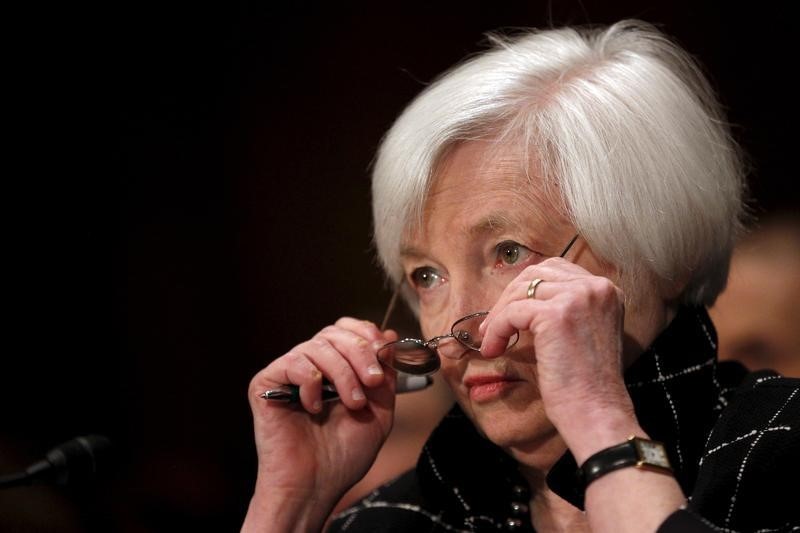Investing.com - Global financial markets will be busy with central bank meetings in the week ahead, with policy decisions due in the U.S., U.K, Japan and Switzerland.
Investors will also keep an eye out for Chinese industrial production data amid recent signs of cooling in the world's second largest economy.
Ahead of the coming week, Investing.com has compiled a list of the five biggest events on the economic calendar that are most likely to affect the markets.
1. Federal Reserve Rate Decision
The Federal Reserve is widely expected to raise the fed funds target range by a quarter point at the conclusion of its two-day policy meeting at 2:00PM ET (1800GMT) on Wednesday, which would put it in a range between 1.0%-1.25%.
The U.S. central bank will release its latest forecasts for economic growth and interest rates, known as the "dot-plot".
Fed Chair Janet Yellen is to hold what will be a closely-watched press conference 30 minutes after the release of the Fed's statement, as investors look for any hawkish change in tone about the economy or future rate hikes.
Market players will also pay close attention to details of the Fed's plan to reduce its $4.5 trillion balance sheet later this year.
The median Fed policymaker forecast is for two more rate increases by year-end, after already raising its benchmark interest rate once this year, by a quarter percentage point in March.
But a recent run of disappointing U.S. economic data combined with growing uncertainty about the Trump administration's ability to pass tax and healthcare reforms sparked doubts over the Fed's ability to raise rates as much as it would like before the end of the year.
According to Investing.com’s Fed Rate Monitor Tool, conviction for a move beyond this week's widely expected rate hike has faded, with just 40% of market players expecting another rate increase later this year.
Besides the Fed, this week's calendar also features U.S. data on inflation, retail sales, producer prices, building permits, housing starts, initial jobless claims, industrial production, consumer sentiment as well as surveys on manufacturing conditions in the Philadelphia and New York regions.
2. Bank of England Policy Announcement
The Bank of England will announce its rate decision at 1100GMT (7:00AM ET) on Thursday, with analysts expecting no change in policy.
Market players expect BoE policymakers to strike a cautious tone in the wake of last week's shock parliamentary election results, which denied any party a majority and fomented a sense of political chaos just days before Brexit talks begin.
The BoE said before the election that monetary policy would remain on hold for at least the next few months as it assesses the extent of any consumer slowdown while waiting to see how EU divorce negotiations pan out.
Besides the BoE, traders will focus on monthly inflation, unemployment and retail sales data for further indications on the continued effect that the Brexit decision is having on the economy.
Investors are also likely to keep an eye out for headlines coming out of London for any new fallout from last week's general elections and how it will impact Brexit negotiations.
3. Bank of Japan Monetary Policy Decision
The Bank of Japan is expected to keep its monetary policy unchanged when it releases its latest rate decision and monetary policy statement at around 0300GMT Friday, as the economy grows modestly despite weak inflation and consumer spending.
The BoJ is seen keeping its short-term policy interest rate at minus 0.1%, while holding the 10-year government bond yield target at around 0%. The central bank is also forecast to keep the net amount of Japanese government bonds it buys annually at around 80 trillion yen.
According to people familiar with the matter, the Japanese central bank is likely to upgrade its economic assessment and signal its growing conviction the recovery is gathering momentum, reinforcing expectations its next move would be to tighten monetary policy.
BOJ Governor Haruhiko Kuroda will hold a press conference afterward to discuss the decision, as market players seek clues on the central bank's exit strategy.
4. SNB Policy Assessment
The Swiss National Bank's quarterly monetary policy assessment is due on Thursday at 0730GMT (3:30AM ET). Most economists expect the central bank’s benchmark interest rate to remain unchanged at -0.75%.
The SNB is also expected to stick to its commitment to foreign currency interventions if necessary, in order to reduce demand for the franc.
SNB Chairman Thomas Jordan recently repeated that the Swiss franc remains “significantly overvalued.”
5. China Industrial Production
The China National Bureau of Statistics is to release data on May industrial production at 0200GMT on Wednesday. Market analysts expect factory output to rise 6.3% last month, after increasing 6.5% in April.
The Asian nation will release fixed asset investment data and a report on retail sales at the same time.
Analysts expect China's economy to cool in coming months after a strong first quarter, with recent factory activity data also indicating a gradual slowdown is underway.
